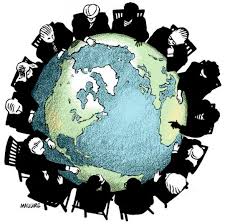The APEC Circus: Unfree Trade and Growing Insecurity

The Asia-Pacific Economic Cooperation gathering in Beijing has been another excuse to go through the motions of old problems and old requests. Rivalries are being scratched and aggravated. The speech writers have been busy attempting to give the leaders some mettle to work with.
The United States stayed true to form with the Obama administration reiterating its desire to see more Australian troops, among other contingents, deployed to a doomed Iraq. (There are already 200 Australian special forces engaged.) In his meeting with Abbott at the US embassy in Beijing, Obama spoke of how the Australian prime minister had personally “expressed his extraordinary commitment to battling foreign fighters that threaten both of our homelands.” Again, a distant enemy, posing threats to regimes that have enabled, in part, their existence to prosper, become localised foes in need of military punishment. Misguided sponsors tend to be aggrieved.
The Chinese and Japanese delegations were unsurprisingly glacial, a relationship placed in refrigeration after recent territorial spats. An Abe-Xi meeting, one lasting 25 minutes, may have been grating to the duellists, but it did at least take place.
Then there was the great hoodwinking rhetoric of free trade and the Trans-Pacific Partnership Agreement, something, it should be added, China is not a party to. Enter the lair of the beast, Obama seemed to be suggesting, then poke its eyes.
The disjunction was even noted by the dimmer members of the press corps, who found the idea of running APEC in Beijing simultaneously with side room chats about the TPP in the snubbed host country a touch jarring. The Australian Prime Minister Tony Abbott was characteristically oblivious. “I think that everyone wants to see freer trade in the Asia-Pacific region” (The Age, Nov 11).
Abbott, along with the leaders of Canada, Mexico, Chile, Japan, New Zealand, Brunei, Malaysia, Peru, Singapore and Vietnam, were all being “hosted” in the US embassy in Beijing at Obama’s insistence. “This has the potential for being a historic achievement,” uttered the president.[1] Those at China’s Xinhua News Agency saw it as an ominous affront. “What the United States [has] done aroused suspicions in this region.”
The issue of China, trade, and agreements designed to keep it shackled, if only superficially, is always doused with a good deal of water when it flares up. China is both problem and salvation, a necessary nuisance dealing with the global pocket book. Obama, in response to a question by an Australian journalist, proferred the old line that, “it’s in all our interests for China to be successful, prosperous and to be an outstanding international partner.”
For all of that, hegemons don’t like equal company in the theme parks of history. The American variant of this is to seek submissive “partners” via trade and security agreements dolled up as informed consent.
The biggest issue regarding the TPP lies, as it often does, in a term. Free trade is fanciful, and at worse, a dangerous fantasy. Such trade junkies would actually have you believe that a regime without tariffs, or reduced tariffs, entails giddy, heart-felt freedom. Instead, such arrangements usually entail restrictions, exclusions, and intrusions. Governments may believe they cannot control the global economic environment, but it would be better to suggest that they simply don’t want to.
Old canards have filled the press conferences and speeches given by Obama at the gathering. They are larded with the talk of manic production, dreamily inflated trade figures, and mechanical like outputs. During the course of “the next five years,” he reminds the APEC CEO gathering, “nearly half of all the economic growth outside the United States is projected to come from right here, in Asia.”[2] There is no actual discussion – or at the very least open discussion – about the ways such growth is meant to be attained. Will it be through protecting the intellectual property rights of developed states in the partnership? What of environmental protections in the wake of accelerated economic growth?
The truth is that the winds have started to cool in the TPP discussions, at least when it comes to specific countries concerned by the Washington agenda. This is hardly mentioned in the banal script befitting an APEC gathering. Nor should it be surprising except to anyone who has ventured to the released chapters on WikiLeaks. (It is questionable whether some of the delegation members in Beijing are actually well briefed about its contents at all.)
Countries who might have initially felt enthused by the prospects of trade Nirvana are starting to retreat to more conservative domestic positions. Electorates can only be lied to some of the time. There are always exceptions. “Australia,” explained Obama, “has been an outstanding partner on that front.” Washington will not tolerate wobbly doubters.
Making sure it won’t be left out of all the excitement about free trade that is free as long as it excludes China, Xi Jinping is vigorously pursuing a rival Free Trade Area of the Asia Pacific. Beijing is doing its own bit of Asia-Pacific “rebalancing”. He promises that China will invest amounts in the order of $1.25 trillion abroad over the next 10 years, while importing something in the order of $10 trillion goods over the next five years. All of this is punchy stuff, though Xi tends to do what his American counterpart does: fantasise about the unpredictable, and posture about the present. Market Leninism, for all its exotic strengths, has its own glaring weaknesses.
Dr. Binoy Kampmark was a Commonwealth Scholar at Selwyn College, Cambridge. He lectures at RMIT University, Melbourne. Email: [email protected]
Notes
[1] http://www.businessweek.com/
[2] http://www.whitehouse.gov/the-

